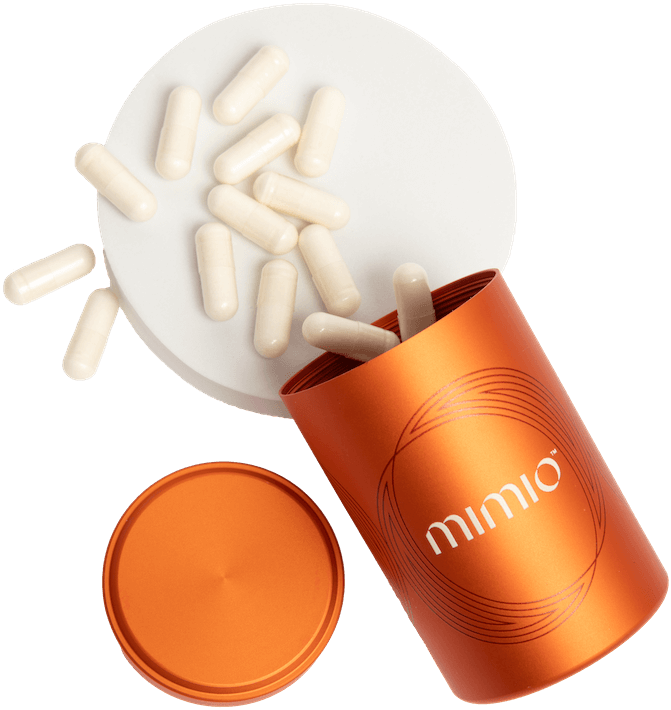At What Age Should You Start Using Anti-Aging Products?
Aging is a natural process, but there are some aspects of aging quality that are in your control. The earlier you start supporting your skin and cellular health, the better. Many people assume anti-aging products are only necessary once fine lines and wrinkles appear, but prevention is far more effective than correction.
So, when is the right time to start? The short answer: as early as your 20s. The long answer? It depends on your skin type, lifestyle, and overall health and longevity goals.
Why Aging Starts Sooner Than You Think
Most people don’t think about aging until they see visible changes, but the process starts long before that. Around age 25, key biological functions that keep your skin firm, smooth, and hydrated begin to slow down:
-
Collagen production declines – Skin loses elasticity, leading to fine lines¹.
-
Cell turnover slows – Skin may start to look dull or uneven².
-
Antioxidant levels drop – Making skin more vulnerable to environmental stressors like pollution and UV damage³.
-
Moisture retention decreases – Skin may start feeling drier or more sensitive⁴.
Because these changes happen at the cellular level before they become visible, starting anti-aging products early helps delay noticeable signs of aging.
The Best Age to Start Using Anti-Aging Products
In Your 20s: Focus on Prevention
Your skin is still producing collagen at a high rate, and cell turnover is functioning optimally. The goal at this stage is to protect and preserve.
Key ingredients to look for:
-
Broad-spectrum SPF 30+ – UV exposure is the number one cause of premature aging. Daily sunscreen use prevents fine lines, sunspots, and loss of elasticity.
-
Antioxidants (Vitamin C, Vitamin E, Green Tea Extract) – Help neutralize free radicals from pollution and UV rays.
-
Hyaluronic Acid – Maintains hydration and plumps the skin.
Recommended routine: A lightweight antioxidant serum, a hydrating moisturizer, and daily SPF. It’s never too early to support your cells, and Mimio’s Biomimetic Cell Care is a great place to start.
In Your 30s: Support Collagen Production
Collagen and elastin start to break down more quickly in your 30s. This is when early signs of aging—like fine lines, mild loss of firmness, and uneven texture—become more noticeable.
Key ingredients to look for:
-
Retinol or Bakuchiol – Helps boost collagen production and increases cell turnover.
-
Peptides – Support skin structure and elasticity.
-
Niacinamide (Vitamin B3) – Strengthens the skin barrier and reduces inflammation.
-
Ceramides – Prevent moisture loss and keep skin resilient.
Recommended routine: Introduce a retinol or peptide serum, use a rich moisturizer at night, and continue daily SPF use.
In Your 40s and Beyond: Repair and Regenerate
At this stage, collagen loss becomes more pronounced, and skin may appear thinner, drier, and less firm. The focus should be on repairing damage, restoring hydration, and strengthening skin structure.
Key ingredients to look for:
-
Growth Factors & Biomimetic Ingredients – Help support skin repair and regeneration.
-
Coenzyme Q10 & Resveratrol – Support mitochondrial function and reduce oxidative stress.
-
Hyaluronic Acid & Ceramides – Prevent dehydration and strengthen the skin barrier.
-
Stronger Retinoids & Peptides – Increase collagen production and improve skin elasticity.
Recommended routine: A targeted anti-aging serum with growth factors, a deeply hydrating night cream, and continued use of antioxidants and SPF.
Anti-Aging is More Than Just Skincare
Topical products play a role in slowing visible signs of aging, but true longevity starts at the cellular level. Skin health is a reflection of overall cellular function, so what you do internally matters just as much as what you apply externally.
How to Support Aging from the Inside Out
-
Prioritize cellular health – Nutrients like NAD+ precursors, polyphenols, and amino acids help fuel the body’s natural repair mechanisms⁵.
-
Reduce oxidative stress – UV exposure, pollution, poor diet, and stress accelerate aging. Antioxidant-rich foods and supplements help mitigate damage⁶.
-
Optimize hydration and nutrition – What you consume directly affects skin elasticity and function⁷.
-
Support mitochondrial function – The body’s energy production declines with age, impacting skin and overall vitality. Cellular health supplements can help restore optimal function⁸.
One of the latest advances in aging science is biomimetic technology, which works with the body’s natural processes to enhance cellular repair and longevity. Learn more here.
The Bottom Line
The best time to start using anti-aging products is before you start to notice any signs of aging.
-
In your 20s: Focus on prevention with SPF, antioxidants, and hydration.
-
In your 30s: Introduce collagen-boosting ingredients like retinol and peptides.
-
In your 40s and beyond: Prioritize repair with growth factors, advanced hydration, and targeted treatments.
Aging well isn’t just about skincare—it’s about supporting your body’s ability to regenerate and function optimally over time. And no matter when you start, it’s never too late to invest in longevity.
References
¹ References ¹ Fisher, G. J., Varani, J., & Voorhees, J. J. (2008). Looking older: Fibroblast collapse and therapeutic implications. Archives of Dermatological Research, 300(9), 531-546.
² References ² Zouboulis, C. C., & Makrantonaki, E. (2011). Clinical aspects and molecular diagnostics of skin aging. Clinics in Dermatology, 29(1), 3-14.
³ References ³ Poljšak, B., & Dahmane, R. (2012). Free radicals and extrinsic skin aging. Dermato-Endocrinology, 4(3), 279-286.
⁴ References ⁴ Elias, P. M., & Feingold, K. R. (2012). Skin barrier dysfunction and repair. Annual Review of Nutrition, 32, 139-163.
⁵ References ⁵ Rajman, L., Chwalek, K., & Sinclair, D. A. (2018). Therapeutic potential of NAD-boosting molecules: The in vivo evidence. Cell Metabolism, 27(3), 529-547.
⁶ References ⁶ Liguori, I., Russo, G., Curcio, F., Bulli, G., et al. (2018). Oxidative stress, aging, and diseases. Clinical Interventions in Aging, 13, 757-772.
⁷ References ⁷ Schagen, S. K., Zampeli, V. A., Makrantonaki, E., & Zouboulis, C. C. (2012). Nutrition and skin aging: A review of the role of dietary interventions in delaying skin aging and preventing cutaneous damage. Dermato-Endocrinology, 4(3), 308-319.
⁸ References ⁸ Bratic, A., & Larsson, N. G. (2013). The role of mitochondria in aging. Journal of Clinical Investigation, 123(3), 951-957.



